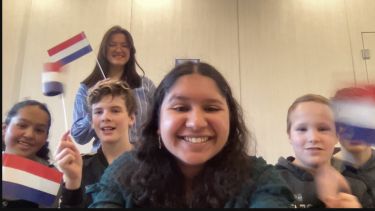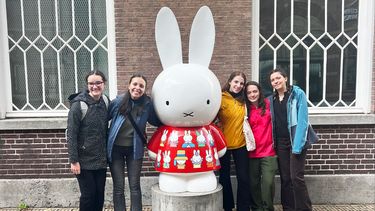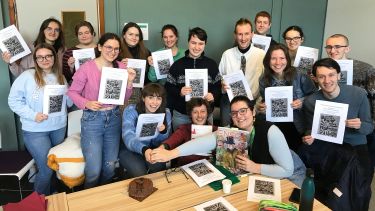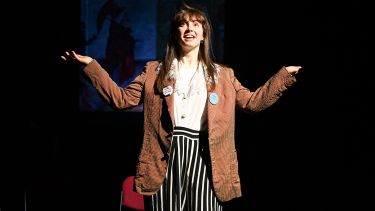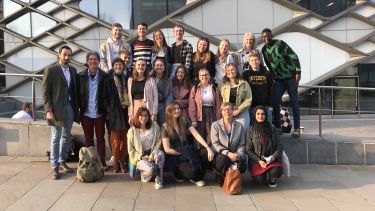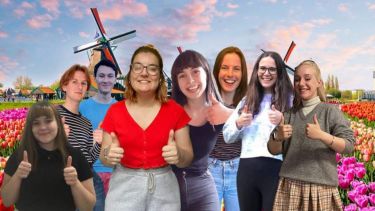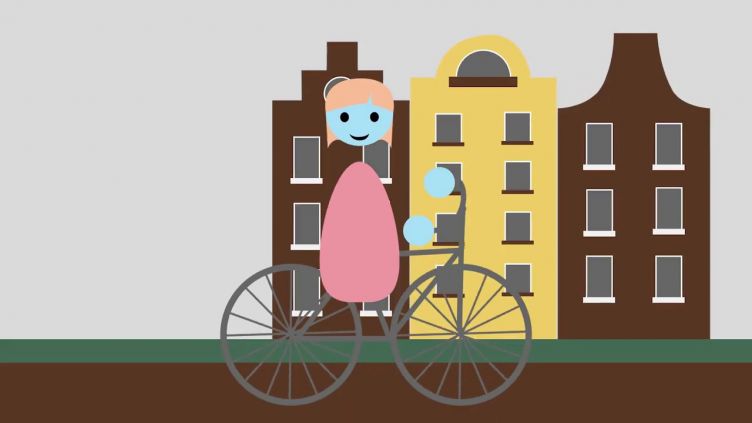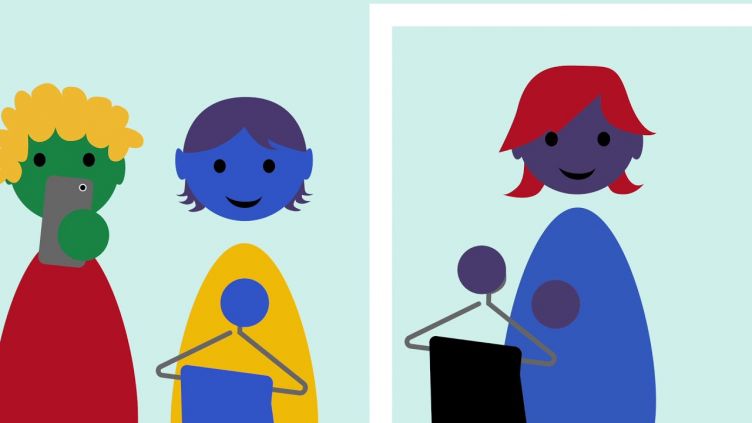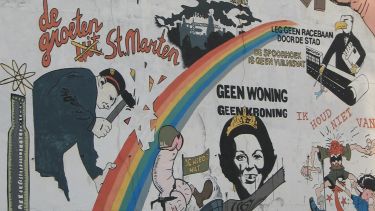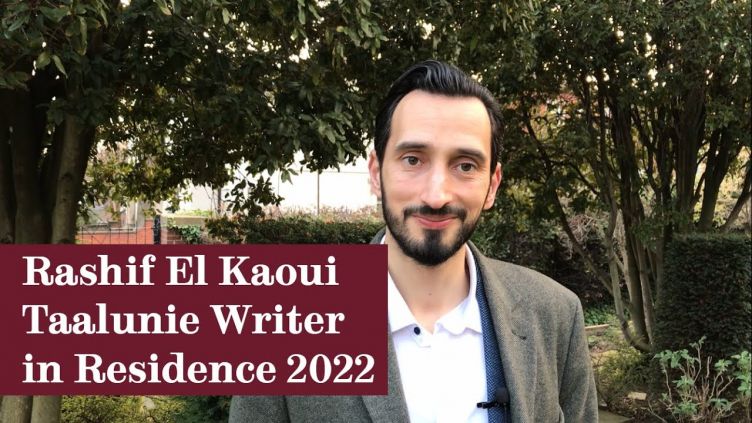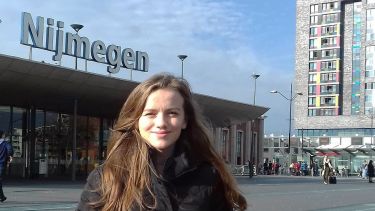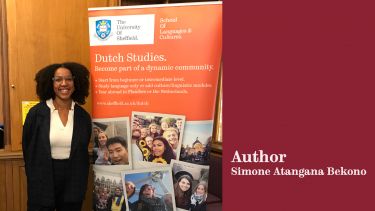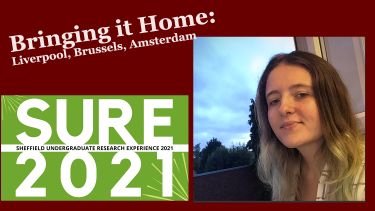Dutch Studies
Spoken across the Netherlands, Flanders, Suriname and parts of the Caribbean, Dutch is a popular language with students and UK employers.

With around eighty students on our programmes, we are the largest Dutch section in the UK in terms of student numbers. This popularity is a testament to the lively, ambitious atmosphere; there is always something going on and you’ll quickly feel included and at home with us.
Undergraduate degree combinations
We try to be as flexible as possible, so you can study Dutch over a period of one, two, three or four years and you can start at either Beginner or Intermediate level. In addition to language, we offer a modules on the history, culture and society of the Low Countries. We offer a specialist Translation Project in collaboration with our Writer in Residence and a professional translator.
You can study Dutch language and culture as part of:
- BA Modern Languages and Cultures
Within this degree you have two options:
- Study Dutch combined with ONE other language and culture
- Study Dutch combined with TWO other languages and cultures
Choose from these languages:
- French
- German
- Russian
- Spanish
- Portuguese
- Catalan
- Luxembourgish
- Czech
- Italian
- Dual Honours Degree
You can combine Dutch with the following non-language subjects:
- Business Management
- English
- History
- Linguistics
- Music
- Politics
You can even combine Dutch with a non-language subject plus another language.
Course structure
Language Modules
At Sheffield you can start studying Dutch from scratch, meaning you need no previous knowledge of Dutch. If you already speak some Dutch you can skip the beginners programme and enter at an appropriate level.
All our language classes are informal and taught in small groups. The emphasis is always on real language in real situations. Right from the start of the course you will be encouraged to speak as much as possible; after all, the best way to learn is by doing. Also, check out our language videos on YouTube.
Dutch Cultural Contexts
You can also opt for Dutch Studies modules. This is the opportunity to put your language skills in the cultural context.
We offer specialist courses on contemporary society, culture and literature of the Netherlands and Flanders as well as course within the context of Germanic Studies. Our small groups teaching means that you have real influence on your course. Many of our courses are aimed at making the most of your position: as a (native) speaker of English you will be in a prime position to negotiate Dutch issues for a global audience.
Dutch as a guided module
You may also be able to study Dutch as part of guided module choice as long as you have some experience with modern language learning. You would be taking the language classes only and you are taught together with the other undergraduate students.
Module information
| Dutch For Beginners | 4 hours per week 2 semesters 20 credits | For this intensive beginners language course you will work for 4 hours a week in small groups. Dutch is an accessible Germanic language spoken by 24 million people. We will work on all aspects of language learning and and you will read your first short book in Dutch before Christmas. With a bit of effort and dedication you will reach a generous CEF level A2. Our students tend to really enjoy this course. |
| Dutch Intermediate Language | 3 hours per week 2 semesters 20 credits | This Dutch Intermediate module builds on the language skills you have already acquired before coming to university. At the end of this course you can understand and speak Dutch in common social circumstances, read all but the most complicated Dutch text without difficulty (perhaps with the occasional help of your dictionary) and write Dutch texts in both formal and informal styles. We work around a number of cultural and everyday topics and our lively conversation classes are an integral part of the course. In terms of CEFR you will have attained at least level B1. |
| Resist! The Art of Protest in Berlin & Amsterdam | 1 hour per week 2 semesters 20 credits | Amsterdam and Berlin are two capitals at the forefront of protest and alternative lifestyles from the early 20th century right up to the present. Where did their radical traditions spring from? What do these protests say about how the cities and nations see themselves? How does creative resistance fuel gentrification and urban tourism? This module explores the culture of resistance and protest from the first women’s march for the vote and posters and activism against war and fascism, to the creative resistance of the Amsterdam provo movement and more recently Pride Canal Parade and Black Lives Matter/Kick out Zwarte Piet. |
| Dutch for Beginners | 4 hours per week 2 semesters 20 credits | For this intensive beginners language course you will work for 4 hours a week in small groups. Dutch is an accessible Germanic language spoken by 24 million people. We will work on all aspects of language learning and and you will read your first short book in Dutch before Christmas. With a bit of effort and dedication you will reach a generous CEF level A2. Our students tend to really enjoy this course. |
| Dutch Intermediate | 3 hours per week 2 semesters 20 credits | This module builds on the language skills you have built up during the Beginners' Dutch course in your First Year. At the end of this course you can understand and speak Dutch in common social circumstances, read all but the most complicated Dutch text without difficulty (perhaps with the occasional help of your dictionary) and write Dutch texts in both formal and informal styles. We work around a number of cultural and everyday topics and our lively conversation classes are an integral part of the course. In terms of CEFR you will have attained at least level B1. |
| Dutch Advanced | 3 hours per week 2 semesters 20 credits | For those students who finished Dutch Intermediate in their first year, we offer an Advanced Dutch language course in Second Year. We will build on your vocabulary in Dutch, you will become more fluent and your grammar gets more and more sophisticated. This growing knowledge and confidence in Dutch means that we can introduce a translation element: you will work with a Dutch or Flemish visiting author and a professional translator. We also focus on speaking and presenting in Dutch with confidence and on writing longer pieces for a variety of audiences for example blogs, commentaries, opinion and creative pieces. You will reach level CEFR B2/C1. |
| Not my (his)Story! Reshaping present-day Netherlands and Belgium | 1.5 hours per week 2 semester 20 credits | Dutch, Belgian, and British colonial legacy are no longer the forgotten pages of history. In this module we will look at recent movements that challenge and confront the colonial past and that shape today’s diverse societies. Our material will vary from artistic responses through stories, performance and graphic novels to official representations of the nation’s history in public sites such as monuments and exhibitions. And what about Sheffield? Get ready to leave the classroom. This module contains a project element in Semester 2 and/or a collaboration with our Writer in Residence and a professional translator. |
| Exploring "Germanic" Lands: Imagined Communities, Tourist Kitsch, and Contested Identities | 1.5 hours per week 2 semester 20 credits | This module traces the idea of nationhood and community across genres (including fiction and non-fiction), looks at cultural stereotyping and critical perspectives in TV, film, or audio In preparation for your own year abroad, you will reflect on popular perspectives on nationhood from an academic distance (via an essay), and will yourselves engage in cultural mediation and critique (through a project, which includes translation). |
There are three Year Abroad options:
University Study
In the Netherlands we have links with:
- Universiteit Utrecht
- Rijksuniversiteit Groningen
- Radboud Universiteit Nijmegen
In Belgium we are partnered with:
- KU-Leuven (Campus Brussel)
- RU-Gent
Read Elinor's account of her study period in Nijmegen.
Teaching Placement
For many years now, our student opt for a teaching placement in the Netherlands. The section has links with the Early English Programme in Den Bosch. Read Alisha's account form spring 2022 and John's from summer 2021.
Work Placement
We have a number of work placements on our books but we also encourage you to find a work placement with your chosen business or charity. Find out how Lydia got on in Antwerp to work at a classical concert hall AMUZ and at an acclaimed theatre, hetpaleis.
We have our Year Abroad requirements, so we check what you suggest, but we believe that it is your Year Abroad and that you can shape your year according to your interests and ambitions.
| Dutch Intermediate | 3 hours per week 2 semesters 20 credits | This module builds on the language skills you have built up during the Beginners' Dutch course in your First Year. At the end of this course you can understand and speak Dutch in common social circumstances, read all but the most complicated Dutch text without difficulty (perhaps with the occasional help of your dictionary) and write Dutch texts in both formal and informal styles. We work around a number of cultural and everyday topics and our lively conversation classes are an integral part of the course. In terms of CEFR you will have attained at least level B1. |
| Dutch Advanced | 3 hours per week 2 semesters 20 credits | Dutch Advanced builds on Intermediate Dutch: your vocabulary grows, you get more fluent and your grammar gets more and more sophisticated. This growing knowledge and confidence in Dutch means that we can introduce a translation element: you will work with a Dutch or Flemish visiting author and a professional translator. We also focus on speaking and presenting in Dutch with confidence and on writing longer pieces for a variety of audiences for example blogs, commentaries, opinion and creative pieces. You will reach level CEFR B2/C1. |
| Dutch for Specialists | 3 hours per week 2 semesters 20 credits | This course is taught together with Dutch Advanced. We cover advanced reading and writing, introduce translation and we concentrate on speaking and presenting. We draw on a Visiting Author, a professional translator, and other guests and native speakers. You will be at a level that you can really benefit from much exposure with native speakers. We aim for CEFR C1/2 level. |
| Not my history? Reshaping present-day Netherlands and Belgium | 1.5 hours per week + co-curricular events 2 semester 20 credits | Dutch, Belgian, and British colonial legacy are no longer the forgotten pages of history. In this module we will look at recent movements that challenge and confront the colonial past and that shape today’s diverse societies. Our material will vary from artistic responses through stories, performance and graphic novels to official representations of the nation’s history in public sites such as monuments and exhibitions. And what about Sheffield? Get ready to leave the classroom. This module contains a project element in Semester 2 and/or a collaboration with our Writer in Residence and a professional translator. |
Dutch Language and Culture Project | fortnightly 1.5 hours support seminar and 6 hours of one-to-one supervision 2 semesters 20 credits | This is our most flexible option: this is about your project for which you will get support and a supervisor. You can either choose to write a dissertation on a Dutch Studies topic OR undertake a substantial translation with a commentary and contextualisation OR plan, execute and disseminate a Dutch Studies project through a chosen format. This is ideal for those students that like to work independently and enjoy engaging with a larger project. It is excellent preparation for postgraduate study too. Your project/translation is likely to be in the field of contemporary Netherlands and Flemish literature or culture or on a sociolinguistic topic. We encourage you to work with one of our many cultural partners and work towards a clear end result that can be shared or presented. In the past this had led to collaborations with the Dutch Centre in London, the British Library, Flemish-Dutch House of Culture deBuren in Brussels, and the-low-countries.com. |
The content of our courses is reviewed annually to make sure it is up-to-date and relevant. Individual modules are occasionally updated or withdrawn. This is in response to discoveries through our world-leading research, funding changes, professional accreditation requirements, student or employer feedback, outcomes of reviews, and variations in staff or student numbers. In the event of any change we'll consult and inform students in good time and take reasonable steps to minimise disruption.
Information last updated:

International undergraduate scholarships
We offer a generous package of financial support for international undergraduate students, including scholarships worth £10,000 towards the annual tuition fee (worth up to £40,000 for four-year programmes).
Applications are open for existing offer holders for an undergraduate degree programme starting in autumn 2025.


